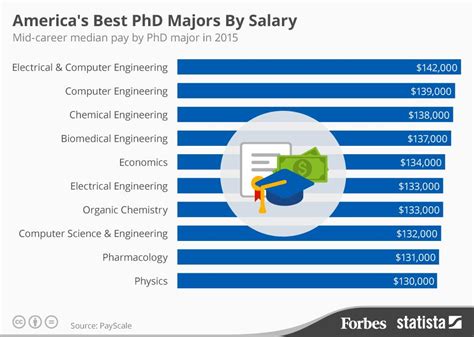Introduction
Obtaining a doctoral degree in Electrical Engineering (EE) is a significant academic achievement that can open doors to lucrative career opportunities in various industries. However, the financial compensation associated with an EE PhD degree can vary widely depending on factors such as industry, experience, education level, and geographic location. This article will provide a comprehensive analysis of EE PhD salaries, exploring the key determinants and the latest trends in the job market.

Industry Outlook for EE PhDs
EE PhD graduates are highly sought after in technology-driven industries such as:
- Semiconductor Manufacturing: $110,000 – $160,000
- Computer Hardware and Software Design: $105,000 – $155,000
- Telecommunications: $100,000 – $150,000
- Aerospace and Defense: $115,000 – $170,000
- R&D and Academia: $90,000 – $140,000
Factors Influencing EE PhD Salaries
Experience and Seniority
Experience plays a significant role in determining EE PhD salaries. As professionals gain more experience in their field, their salaries tend to increase. Industry veterans with 10 or more years of experience can earn upwards of $200,000 per year.
Education Level
In addition to a PhD degree, obtaining additional certifications or specialized training can further enhance an EE PhD’s earning potential. For example, pursuing a Master’s degree in Business Administration (MBA) or an Executive MBA (EMBA) can qualify individuals for leadership roles with higher compensation.
Geographic Location
The geographic location of employment can also impact EE PhD salaries. The highest salaries are often concentrated in technology hubs such as Silicon Valley, Boston, and Austin, where there is a strong demand for skilled engineers.
Industry Specializations
EE PhDs who specialize in cutting-edge technologies, such as Artificial Intelligence (AI), Machine Learning (ML), or Cybersecurity, may command higher salaries due to the high demand for their expertise.
Table 1: EE PhD Salary by Industry
| Industry | Median Annual Salary |
|---|---|
| Semiconductor Manufacturing | $115,000 |
| Computer Hardware and Software Design | $107,000 |
| Telecommunications | $102,000 |
| Aerospace and Defense | $120,000 |
| R&D and Academia | $95,000 |
Table 2: EE PhD Salary by Experience Level
| Experience Level | Median Annual Salary |
|---|---|
| Entry-Level (0-3 years) | $100,000 |
| Mid-Career (4-9 years) | $120,000 |
| Senior-Level (10+ years) | $150,000 |
Benefits and Perks for EE PhDs
Beyond salary, EE PhDs may also receive a range of benefits and perks, including:
- Health Insurance: Medical, dental, and vision coverage
- Retirement Plans: 401(k) and pension plans
- Paid Time Off: Vacation, sick leave, and holidays
- Professional Development: Training, conferences, and educational reimbursement
- Stock Options or Profit Sharing: Equity-based compensation for select positions
Tips and Tricks for Negotiating a Higher EE PhD Salary
- Research the industry benchmarks: Gather data on salaries for similar positions in your industry and geographic location.
- Showcase your skills and experience: Highlight your accomplishments and quantify your results whenever possible.
- Be prepared to negotiate: Practice your negotiation skills and be willing to compromise on certain aspects of the offer.
- Build your network: Attend industry events and connect with professionals in your field to expand your job opportunities.
Common Mistakes to Avoid
- Underestimating your worth: Researching the market thoroughly and understanding your value will help you avoid accepting a salary below your potential.
- Focusing solely on salary: While compensation is important, consider the overall benefits package and career growth opportunities.
- Overdemanding: Being unrealistic with your salary expectations can damage your negotiating position.
- Accepting the first offer: Take some time to consider multiple offers and compare the benefits and perks before making a decision.
Table 3: EE PhD Salary by Location (2023)
| Location | Median Annual Salary |
|---|---|
| San Francisco Bay Area | $160,000 |
| Boston | $155,000 |
| Austin | $150,000 |
| New York City | $145,000 |
| Seattle | $140,000 |
Table 4: EE PhD Salary vs. Other Engineering PhDs (2023)
| Engineering PhD | Median Annual Salary |
|---|---|
| Electrical Engineering (EE) | $115,000 |
| Computer Science (CS) | $120,000 |
| Mechanical Engineering (ME) | $110,000 |
| Biomedical Engineering (BME) | $105,000 |
| Chemical Engineering (ChE) | $100,000 |
Innovative Applications for EE PhDs
The rapid advancement of technology is creating new and exciting opportunities for EE PhDs. Here are a few examples of innovative applications that are transforming industries:
- Smart Grids: EE PhDs are developing intelligent systems to optimize energy distribution and reduce waste.
- Wireless Communication: EE PhDs are researching new technologies to improve the speed, reliability, and coverage of wireless networks.
- Artificial Intelligence: EE PhDs are playing a key role in developing self-driving cars, medical diagnosis systems, and other AI-powered applications.
- Bioengineering: EE PhDs are collaborating with other disciplines to create medical devices, wearable sensors, and other advancements that improve human health.
- Cybersecurity: EE PhDs are developing sophisticated security measures to protect networks and data from cyberattacks.
Conclusion
Obtaining an EE PhD degree is a significant investment that can lead to a rewarding and lucrative career. With a strong understanding of industry trends, career prospects, and salary expectations, EE PhDs can maximize their earning potential and make valuable contributions to the advancement of technology. The future of Electrical Engineering is bright, with endless opportunities for graduates to make a meaningful impact on the world.
